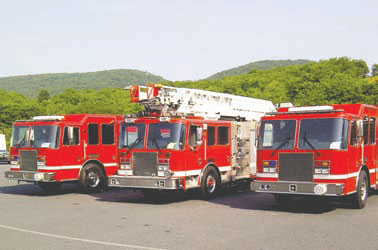Venture seen as boost to Chinese firefighters
|
KME trucks are shown at China Fire Expo 2013 in Beijing. Provided to China Daily |
A firetruck-manufacturing venture involving China's Brilliance Auto and two US makers of firefighting vehicles could help China more effectively combat high-rise fires, an executive with the project said.
Formally named Brilliance China Automotive Holdings Ltd, the company has partnered with Kovatch Mobile Equipment Corp, or KME, of Pennsylvania and First Priority Emergency Vehicles of New Jersey to make firetrucks for the Chinese market.
The venture, which like Brilliance Auto is based in northeastern China's Liaoning province, introduced its vehicles at China Fire Expo 2013 last week in Beijing. It has already received its first order for 80 pumpers and tankers, which will be built at KME's headquarters in eastern Pennsylvania, according to Bob Freeman, CEO and founder of First Priority. The order is valued at about $32 million, he told China Daily.
"In America, high-rise firefighting is an art," Freeman said. "The equipment we use is much different than what is available in China.
"We want to have a meaningful impact on the Chinese firefighting service by allowing them to have a more sophisticated grasp of firefighting capabilities. It's about putting better tools in the hands of the heroes who are the firefighters there."
With about 35,000 employees and revenue last year of $12 billion, Brilliance Auto, the 10th-biggest Chinese vehicle producer, already has a carmaking joint venture with Germany's BMW. It also builds minibuses with Toyota Motor Corp of Japan.
Its US joint venture calls for Brilliance to provide workers to produce firetrucks in a 325,000-square-foot (31,000-square-meter) assembly plant in Liaoning's Dalian Economic Zone, starting in July. It will sell the vehicles through a100-dealer network.
The JV will rely on First Priority's expertise as a builder and exporter of smaller firetrucks in matching American technology with the Chinese market's needs, including water sources and equipment, Freeman said. First Priority has about 50 employees and annual sales of $22 million.
KME, with 700 workers and yearly revenue of $150 million, makes heavy-duty firetrucks used in cities and towns across the US. It builds about 500 firetrucks a year. KME President and CEO John Kovatch III said the Dalian plant will be the company's first China-based manufacturing facility.
The venture will produce 100 vehicles in its first year, ramping up to between 300 and 500 by the end of the fifth year. Freeman said China needs about 5,000 to 6,000 firetrucks a year and imports about 1,000 of them, including about 100 from the US.
"The same vehicles you see in the City of New York - that's the largest fire department in the world - those same-quality vehicles will be exported to China, and eventually manufactured in China," Freeman said. "At the end of the day, you will not be able to tell whether that truck was made in America or in China. They're going to be exactly the same, to exactly the same standards."
KME's chief financial officer, Richard Reaman, called the project "a model" for US-China joint ventures because it places "cutting-edge fire apparatus in the hands of China's proud firefighters, while supporting our economy in America with new jobs created in Pennsylvania and New Jersey". He said KME was "honored" that Brilliance "has chosen to partner with us and First Priority in this landmark endeavor".
High-rise fires have become a serious problem in China. Many buildings from the nation's construction boom exceed the reach of firefighters and their equipment. In November 2010, when flames engulfed a 28-story Shanghai apartment building, killing at least 53 people, news reports said hoses strained to reach even the middle of the building. In February 2009, hoses were unable to reach the upper two-thirds of a blazing 34-story hotel and cultural center in the city. One person died.
"As a kid you see a movie like 'The Towering Inferno', but that doesn't happen here," Freeman said. "But it happens in China.
"Some of the fire apparatus doesn't have the reach that our American aerial ladders have. Secondly, they don't have the ability to deliver water at high pressure at high levels in buildings. So they have lots of resources and they have lots of firetrucks and they have lots of firemen, but they don't have these big, heavy-duty, sophisticated fire apparatus that can put out fires like that."
"The new government is very socially conscious [and concerned] about the safety of its citizens," Freeman said. "And we think there's definitely an opportunity for American fire apparatus."



















